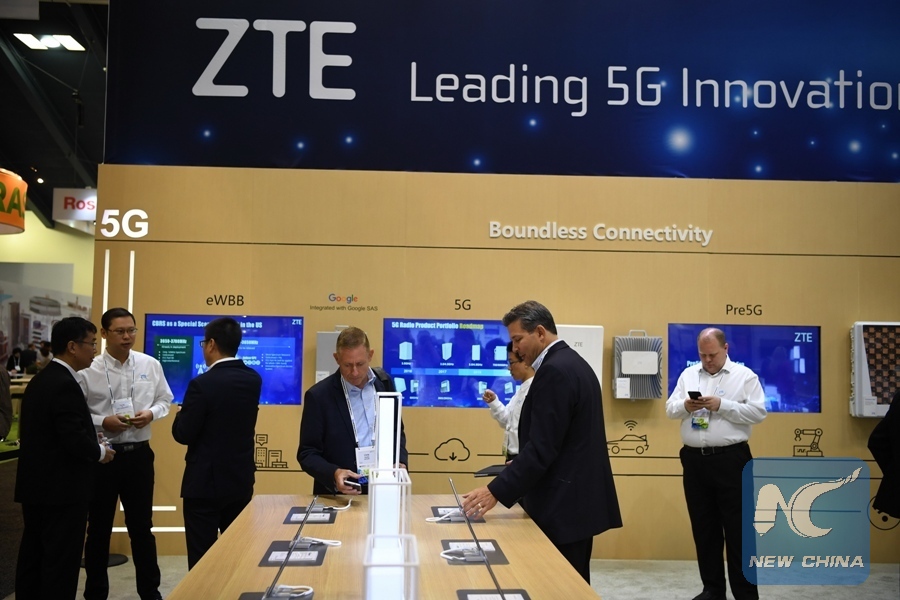
People visit the booth of Chinese telecommunication firm ZTE Corporation during the 2017 Mobile World Congress Americas (MWCA) in San Francisco, the United States on Sept. 12, 2017. (Xinhua/Wu Xiaoling)
By Xinhua writers Xu Xingtang and Wang Naishui
NEW YORK, April 17 (Xinhua) -- The U.S. Department of Commerce announced a market-shaking decision on Monday to deny export privileges against ZTE, a leading Chinese telecom equipment company, stoking up the tension of trade relations between the two countries.
This was only the latest and one of the many cases of Chinese companies being sanctioned by the United States over the past years. The Trump administration has been accusing China on trade surplus, intellectual property protection and other issues.
China's biggest smart phone producer Huawei still can't make a meaningful entry into the United States after decades of efforts, as AT&T and Best Buy rejected or stopped selling Huawei phones weeks ago due to pressure from the administration in the name of "national security" concerns.
"National security" has become a magic tool for the world's biggest developed free market economy to restrict businesses of Chinese companies.
While asking China to further open its financial sector, which China did do so gradually based on the reality of its domestic economic development and announced other significant moves recently, the U.S. government blocked China's Ant Financial's acquisition of MoneyGram in January, due to "national security" concerns.
"We are disappointed in the termination of this compelling transaction, which would have created significant value for our stakeholders," said Alex Holmes, chief executive officer of MoneyGram, noting the geopolitical environment has changed considerably since nearly a year ago.
Due to the same reason, China Zhongwang Holdings Limited, an aluminum product manufacturer listed in Hong Kong, also failed to merge U.S. aluminum firm Aleris Corporation, although afterward the U.S. government announced a 10-percent tariff on imported aluminum products, claiming to force foreign companies to build plants in the United States and bring jobs back.
Even a Chinese firm of agriculture and animal husbandry had to drop the planned acquisition of U.S. supplier of breeding pigs Waldo Farms, a deal of 16.5 million dollars. Still, it is "national security" concerns.
In comparison, American companies have profited to great extent from the Chinese market during China's opening up and reform drive in the past four decades, thanks to improving business environment and preferential taxation policies specially designed for foreign investments.
In its fiscal year of 2017, Apple, the U.S. biggest cell phone maker, sold 44.8-billion-U.S.-dollar products in China, its largest single market overseas.
According to the latest annual report released in September 2017 by the Committee on Foreign Investment in the United States (CFIUS), a multi-agency panel that reviews foreign purchases of American companies, China had led foreign countries represented in the CFIUS reviews for the fourth consecutive reported year (2012-2015).
Given the surging number of transactions that had been scrutinized by CFIUS and the economic environment between China and the United States in 2016 and 2017, there is no doubt that China will remain on top of the list for a six-year straight streak.
However, such opaque and unfair scrutiny by CFIUS has become a main hurdle for Chinese companies to invest in the United States.
According to a report jointly released by the National Committee on U.S.-China Relations (NCUSCR) and the Rhodium Group last week, Chinese direct investment in the United States fell by more than 35 percent in 2017 due to CFIUS' reviews and China's outbound investment regulatory.
The value of newly announced Chinese acquisitions in the United States also plunged by 90 percent from a year earlier and the impact from such decline in investment had been felt on the local level, according to the report.
Moreover, the Trump administration and U.S. lawmakers are seeking tighter scrutiny of Chinese investment in the United States through a significant expansion of the CFIUS.
This happened at a time when the United States is blaming China for its vast trade deficit while narrowing the door for Chinese investment.
China argues that the Chinese people's hard work is part of the reason for China's trade surplus with the United States. A number of facts such as globalization, global division of labor and U.S. dollar's international reserve currency status also play important roles for the surplus.
When addressing trade issues, the United States seldom mentions its surplus with China in service sector, and never mentions the U.S. government export controls over China.
It is unfair that on one hand the United States restricts the export of high-tech products to China, while on the other it doesn't want China to produce them by itself either.
Analysts have said that the U.S. punitive measures taken recently against China are not about trade, but about the impediment of China's development.
China is a big developing country, but it's no wonder the country wants to become a developed one, Nobel Prize-winning American economist Joseph Stiglitz said at a panel discussion last week.
In the increasingly globalized world, any trade protectionist measures could turn out to be a double-edged sword.
The latest U.S. decision on ZTE may hit the Chinese company hard, but the first casualties are its U.S. suppliers. The stock price of ACIA plunged 35.97 percent on Monday, that of Oclaro dropped 15.18 percent, and Lumentum fell by 9.06 percent.

